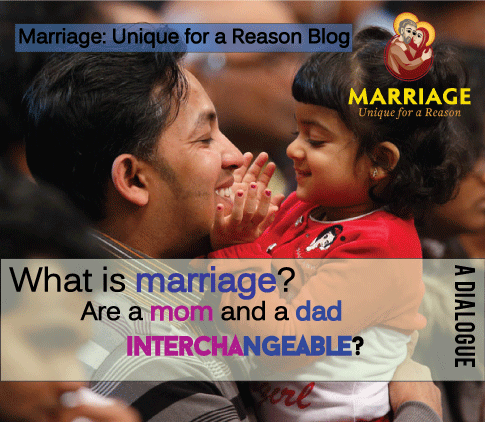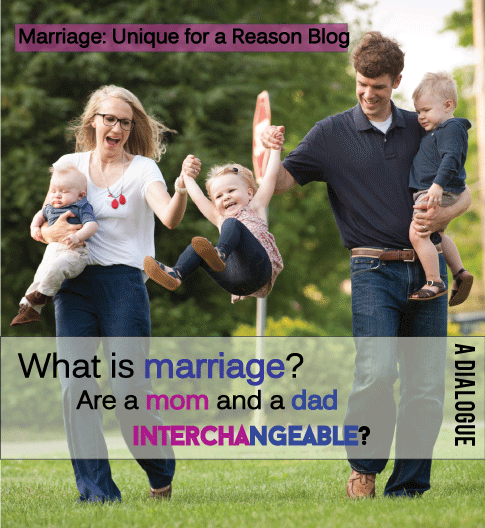A Dialogue on Marriage: Part Six
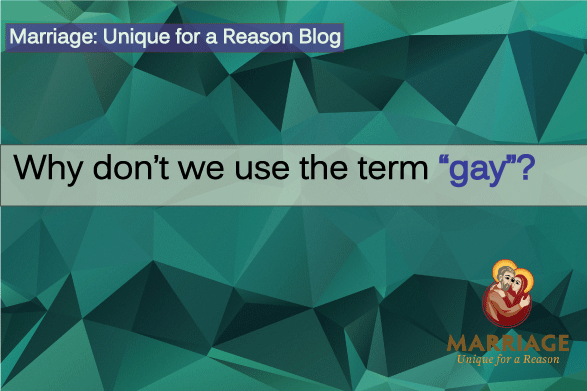 Today we finish our series in which we have eavesdropped on Socrates and a person of good will (Bob) discussing the question “What is Marriage”. Let us know if it was helpful!
Today we finish our series in which we have eavesdropped on Socrates and a person of good will (Bob) discussing the question “What is Marriage”. Let us know if it was helpful!
Socrates: Well Bob, I think you wanted to talk more about the distinction I made between use and respect.
Bob: Yes, I did. You made it sound as if people in a same-sex relationship don’t respect one another, and I totally disagree with that.
Socrates: I’m sorry if that’s what it sounded like. I didn’t mean that they disrespect one another in any sort of conscious way. What I meant is that, objectively speaking, what they are doing with their bodies sexually does not respect the way that their bodies are made or the full meaning of sex.
Bob: Why?
Socrates: Because the sexual expression of human beings is meant to unite the two ways of being human with one another, with the possibility of creating new life—all of course within marriage. A man’s body, in its sexual capacity, only makes sense when paired with a woman’s, and vice versa.
Bob: But don’t many men and women use and disrespect each other? I see people in same-sex relationships that seem to care for one another more than some opposite-sex relationships I know.
Socrates: That’s true. Unfortunately, many men and women disrespect each other, for example by having sex outside of marriage or by using each other in marriage. But we’re talking about the meaning of the human body and sex. This meaning can be respected or disrespected whether one is same-sex attracted or opposite-sex attracted.
Bob: Okay, fine. But people of the same sex can still be the best of friends even if they don’t express it sexually. Also, I know someone who is gay and lives with his partner, and their relationship teaches me a lot about love and acceptance of one another.
Socrates: Have you noticed that I don’t use the term “gay” to describe anyone?
Bob: I had noticed that, yeah, mostly because it makes this dialogue quite wordy. You keep saying “persons attracted to the same sex” or “persons with same-sex attraction.” Why?
Socrates: Well, should a person be defined by their sexual attraction? They are a man or a woman; that means they are objectively made in such a way that they can unite totally with a person of the opposite sex. That’s a fundamental fact; if they experience sexual attraction for someone of the same sex, acting on that isn’t ever going to lead to full union. Calling someone “gay” or a “lesbian” means that you are defining them by an attraction that is at cross-purposes with their identity as a man or a woman.
Bob: But if that’s how they define themselves, it’s silly, even disrespectful, of me not to.
Socrates: I disagree. I think that by refusing to define someone by their sexual attractions, you can remind them that they have lots of other qualities and that you don’t put them into one label.
Bob: Okay I can see what you mean. I’m going to have to think about this more because I haven’t thought that it’s that big of a deal. I get what you’re saying that sexual attraction is only part of the person, but at the same time, adults tend to structure their lives around sexual relationships.
Socrates:You’re right. But if you think that someone’s sexual relationship may be harmful to them, you don’t want to define them by it, right?
Bob: Right. But if they’re my friend, they’re my friend. Period. I will be there for them, no matter what, and they can tell me anything. They don’t have to hide with me.
Socrates: Okay. What if they want your approval of a sexual relationship that they’re in? What if they want society to approve of their relationship as a marriage?
Bob: I would just tell them that I love and care about them… but I’m not sure about the marriage thing.
Socrates: Why not?
Bob: I don’t know. I have to think about it.
Socrates: Okay. That’s an important question. Thanks for thinking about it, Bob. Look forward to our next opportunity to chat. Well I guess the only thing I’d want to say to you as we end is that I think people with same-sex attraction have a pretty important role to play these days.
Bob: Thanks, Socrates.
FAQ: Why does the Catholic Church care so much about marriage?
Archive
A Dialogue on Marriage: Part Five
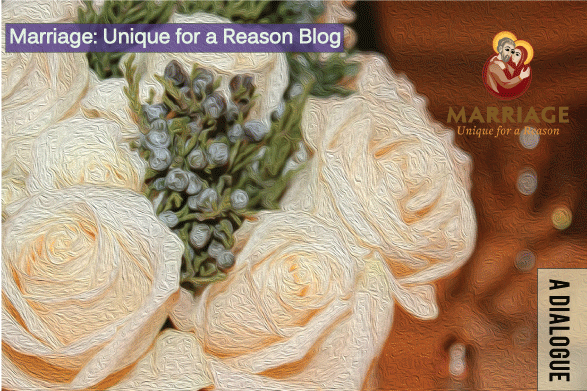 Part Five of the Six-Part series beginning with the question, “What is Marriage?”
Part Five of the Six-Part series beginning with the question, “What is Marriage?”
Socrates: Bob, I have a cute story to share with you, if I may.
Bob: Sure, go ahead.
Socrates: I was tucking my daughter into bed, and she got a dreamy look on her face as she said, “Daddy, I want to marry you.” I smiled and told her that she couldn’t marry me, but that someday she might want to marry someone else. She looked very sad, and said, “But I love you so much!” I told her that she would always love her daddy, but that love isn’t the same kind of love as married love.
Bob: I think I know where you’re going with this.
Socrates: Well what do you think about that? Should a daughter be able to marry her dad, since she loves him?
Bob: Of course not!
Socrates: But why not?
Bob: Because, like you said, it’s a different kind of love—or at least it should be.
Socrates: Do you think it is true love though?
Bob: Of course.
Socrates: Then we agree that there are several ways of truly loving people, not all of which lead to marriage.
Bob: Naturally. But I think that the love that two men or two women have for each other can be the kind that leads to marriage.
Socrates: Even though, when we talked previously, you admitted that they can’t unite completely, the way that a married man and woman can?
Bob: They can unite on a deeply personal level though, and be companions for one another throughout life . Maybe it shouldn’t be called marriage, but it’s something.
Socrates: What would you call it?
Bob: Some laws call it a civil union— that they are close friends who support one another and love each other, and implied in that love is a sexual relationship.
Socrates: Do you think that the sexual relationship is an integral or essential part of a same sex friendship then?
Bob:Not in general, but for people who are attracted to the same sex, it is: yes!
Socrates: Then you would say that the body itself is neutral in terms of sexual expression?
Bob: What do you mean?
Socrates: It seems you’re saying that the body, the way it’s made, doesn’t reveal how one’s sexuality is meant to be expressed.
Bob: You mean that the attraction and the body are entirely different things, so that a man can be attracted to either a man or a woman and it’s basically the same thing?
Socrates: Right. Is that what you think?
Bob: Yes. Clearly some people are attracted to others of the same sex. You wouldn’t deny that, would you?
Socrates: No, I wouldn’t, but I would question the idea that just because it happens, it’s the same as when someone is attracted to people of the opposite sex.
Bob:Sexual attraction is just that, attraction… being drawn to someone, feeling connected to them. It’s not everything about a person, but it is pretty determinative of a person’s life: who they love.
Socrates: Okay, but what is the “end” of sexual attraction?
Bob: What do you mean, “end”?
Socrates: I mean purpose. What is the purpose of sexual attraction?
Bob:The continuation of the species… and the making of a community and family.
Socrates: How does sexual attraction to a person of the same sex continue the species?
Bob: It doesn’t; but it can make two people into a community.
Socrates: How?
Bob: Like I already said, they can share a life together.
Socrates: Okay, but I can’t see any reason why being “a community” requires a sexual relationship. In fact, I think a sexual relationship in which the most obvious purposes of sex (total union and procreation) are not respected does more harm than good. That’s usually the case when something is used in the wrong way, and not treated with the dignity or respect it deserves.
Bob: We’re going to have to come back to this.
FAQs: Isn’t marriage a private relationship? What does it have to do with the common good?
What about “civil unions” or “domestic partnerships”?
Archive
A Dialogue on Marriage: Part Four
 Continuing the series on marriage with Bob and Socrates. Check out parts one to three first!
Continuing the series on marriage with Bob and Socrates. Check out parts one to three first!
Bob: I think I understand now your objections to same-sex couples being considered the same as married couples: it’s about children and what’s good for them.
Socrates: That’s true, but it’s not all. It’s also about doing justice for everyone, even those who are attracted to persons of the same sex, since they were also made to love as God does.
Bob: Except that’s what you’re denying them: the right to love.
Socrates: Who said that?
Bob: You did. You said they can’t get married because that’s not what marriage is.
Socrates: Is marriage the only form of love?
Bob: No, but it is the ultimate form. Even according to the Bible!
Socrates:You mean because marriage is a symbol of Christ’s union with the Church?
Bob: Yes. Basically, you’re denying people the ultimate way to express their love for each other.
Socrates: How did Christ express His union with the Church?
Bob: By marrying her, like I said.
Socrates: And when did He marry her?
Bob: I don’t know. Didn’t Jesus go to a wedding at some point?
Socrates: Yes, He did, but it wasn’t His own. I’ll give you a hint: Jesus showed His love by dying for the Church.
Bob: Oh. On the cross.
Socrates: (silence)
Bob: What?
Socrates: Well it doesn’t sound like Christ’s idea of love or marriage is about an emotional attachment to another adult, does it? It sounds more like Christ’s love was expressed by self-sacrifice; by offering Himself to do the Father’s will, even when that was obedience unto death.
Bob: What are you saying?
Socrates: I’m saying that we are all called to imitate Christ before anything else. Every one of us is called to sacrificial love. For some people, that means the total gift of self in marriage, which always entails sacrifices. For others, loving as Christ does may mean celibacy for the Kingdom of God.
Bob: But telling someone they have to be celibate for life seems so harsh.
Socrates: Only if you equate love with sex and don’t acknowledge other ways of finding love and fulfillment. There’s also a distinction between telling someone they have to do something and someone’s freely choosing and accepting to be celibate.
Bob: Sounds like we might need to talk about this more.
FAQ: Isn’t it unjust discrimination to not allow two men (or two women) to marry?
Archive
A Dialogue on Marriage: Part Three
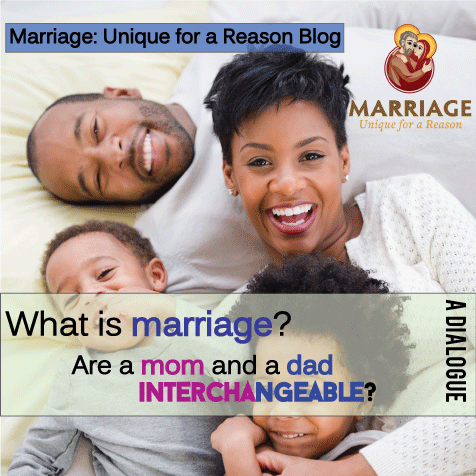 This is Part Three of a Six-Part series on the question, “What is Marriage?” Please check out parts one and two before this!
This is Part Three of a Six-Part series on the question, “What is Marriage?” Please check out parts one and two before this!
Socrates: So Bob, have you had a chance to think about what we talked about last time?
Bob: Yes, I have, and I realized that you are missing a really important fact.
Socrates: I am?
Bob: Yes. You are presenting the ideal. I’m talking about what’s real. There are a lot of children who, for lots of reasons, can’t be raised by their biological mother and father.
Socrates: I know that.
Bob: Well if that’s true, then it means that we have to accept the reality of the situation and try to do something good for the child, even if it is not ideal.
Socrates: You’re right. What are you proposing?
Bob: One of the ways we can help children is by allowing a same-sex couple to adopt them, thus creating a family.
Socrates: That’s a bit of a leap, isn’t it?
Bob: What do you mean?
Socrates: I mean that you looked compassionately at a tragic situation that many children find themselves in, and then jumped to a “solution” that doesn’t actually meet the need that they are experiencing.
Bob: I’m sorry; I still don’t quite follow you.
Socrates: Let’s say that a child is born to a mother and a father, who are both subsequently killed in a car accident. There is no other family, and the child is placed under the care of the state. That seems like the worst thing that can happen to the child, right?
Bob: Right. Even losing just one parent is terribly traumatic for a child.
Socrates: Exactly. So what has the child lost, when his or her parent dies?
Bob: The child has lost the real-life connection to and support of his or her mother and father; a relationship that should have guided the child into adulthood.
Socrates: Right. Like we talked about last time, a child would miss not just the functions that a mom and dad serve; he or she would miss the relationship to a person of each sex who relate to the child in a unique way, as well as the chance to observe the mom and dad relating to each other.
Bob: Yes, that’s right.
Socrates: Can you see how your solution—allowing two persons of the same sex to adopt—does not solve this problem?
Bob: You mean because the child will still be missing either a mom or a dad?
Socrates: Precisely.
Bob: I guess you’re right, but the child is still missing his or her own mom and dad, no matter what adoptive situation comes up. I don’t think it’s that big of a difference to the child whether he or she is adopted by a man and a woman or two people of the same sex, as long as the child is loved.
Socrates: It is true that an adopted child usually loses a real-life connection to their biological parents (at least most of the time) and that’s sad, no matter what happens next.
Bob: Adoption is always a response to a non-ideal situation—to a need or a deprivation experienced. Is that what you mean?
Socrates: Yes. But when the child is adopted by a married mother and father, he or she will still be given a concrete and living relationship with both a mom and a dad. They will still experience those different relationships and be able to observe the relationship between the parents as a model.
Bob: But there are plenty of children who are adopted or being raised by single parents who do just fine .
Socrates: The question of single parenthood is an interesting one and actually distinct from the question of adoption by two persons of the same sex. Perhaps we can take it up again at another time.
FAQ: Why is a child meant to have both a father and a mother?
Archive
A Dialogue on Marriage: Part Two
Today we continue to eavesdrop on a conversation about marriage, begun on Monday.
Socrates: So Bob, when last we spoke, we were talking about whether it’s important for children to be raised by both a mother and a father.
Bob: Yes, that’s right. And I pointed out that parenting skills are not the issue when it comes to what children need; obviously two men or two women can have great parenting skills.
Socrates:That’s true, I think. Would you say that fathering and mothering is primarily about certain qualities or skills, or rather about a relationship?
Bob: What do you mean?
Socrates: A mom and a dad can both change a diaper equally well, for example—that’s a skill, and, come to think of it, a babysitter can do that just as well as a parent. But if fathering and mothering are about a relationship, then it’s not so much that a father does different things than a mother does, but rather that moms and dads do similar or even identical things differently.
Bob: Oh, okay. I would say the relationship then, if you put it that way. A father relates to his child in a different way than a mother does, and vice versa—even if they share certain skills.
Socrates: Do you think that’s a good thing?
Bob: Yes, I do.
Socrates: So you would agree, then, that speaking about fathers and mothers always implies unique relationships within the family: father to mother, father to child, mother to child, father to mother to child?
Bob: That makes sense, but I don’t understand how this relates to the question about marriage.
Socrates: You agree that the father-child relationship and the mother-child relationship are different, right?
Bob: Yes.
Socrates: And that having both a mother and a father is the best thing for a child?
Bob: Sure, I would say that.
Socrates: Okay, then I would just point out that your definition of marriage doesn’t show that.
Bob: You mean that if marriage is, as I said, about “two adults in a sexual relationship who commit to live together and have a family together,” then the father-mother-child relationship doesn’t necessarily figure into the discussion, because the emphasis is on adults?
Socrates:That does seem to follow. But if marriage is and can only be a union of a man and a woman, and the child comes from that union, then the father-mother-child relationship would be really important to the discussion.
Bob: Are you saying that when people talk about marriage today, they may be talking about a different thing?
Socrates: Yes, you can put it that way. The meaning of marriage matters, and many times that meaning is presumed but not examined.
Bob: How so?
Socrates: If marriage is the permanent, faithful, and fruitful union of a man and a woman, it is the only reality that truly unites for life a man and a woman and any children conceived of their union as a family. If, on the other hand, marriage is simply about adults and about validating their own commitments, attachments, and desires—however well intended they may be—this is a different understanding.
Bob: But don’t most people agree that marriage is mostly about adults loving each other?
Socrates: That’s not clear, since many people are not asking the right question; they ask why certain couples can’t get married instead of asking what marriage is. We all should be concerned about asking the right question and arriving at the correct answer. Because, as you agreed, every child has a mother and a father, it would seem to follow that promoting the correct understanding of marriage, not censoring it, is really important for children and for all of us.
Bob: Interesting. I’ll get back to you.
—
FAQ: What is Marriage?
Archive
A Dialogue on Marriage: Part One
All of the talk about marriage hinges on this question; often, when we ask it simply and directly, the answer is halting, hesitant, and surprising. When we ask a question like this, we should try to approach it with genuine curiosity and a willingness to try to figure out the truth. Socrates, for one, was always asking questions in order to help others come to understanding. So let’s try approaching marriage with this form of philosophical questioning in mind.
Socrates: What is marriage?
Bob: It’s when you love someone and commit to live together and have a family.
Socrates: A man loves his mother, lives with her and is family with her: is that a marriage?Bob: No, no—marriage is when you love someone you’re not related to, and then you choose to become related.
Socrates: Like adopting a child?
Bob: No, not like adoption. The person you love is another adult.
Socrates: What do you mean by love?
Bob: A close, intimate relationship whereby you desire to unite with the other person completely; you share a home with that person; you want to have a family together.
Socrates: Oh, then you must mean a man and a woman.
Bob: No, I didn’t say that. A man and a man could do the same thing.
Socrates: How?
Bob: Two men or two women could love each other just like a man and a woman can. They can care for the other person before themselves, share deep communication, and adopt children together.
Socrates: Oh I thought you said that they unite “completely” and that they have a family “together.”
Bob: I did.
Socrates: But two men or two women cannot physically unite completely; it is impossible. Likewise, they cannot have children because they do not have the capacity.
Bob: Don’t be so crass. The two people can express their love sexually, that’s all I meant.
Socrates: But that’s not what you said. You said that married people unite completely. Now you’re saying that they only unite mostly—financially, socially. In which case, I’m not sure why that relationship should be considered special compared to other relationships. You can unite that way with many people; there’s no reason for friendship to be exclusive. Also, what about two sisters living together and taking care of a younger sibling with special needs? Are they married?
Bob: No, the point is that there are two adults in a sexual relationship who commit to live together and have a family together.
Socrates: Oh, so what’s crucial for marriage, you say, is that the two people are in a sexual relationship of some committed kind, though not a kind that necessarily brings about a union of their bodies. How do they have a family, by the way?
Bob: Often, one of the two people has children from another relationship.
Socrates: From a relationship with someone from the other sex…
Bob: Yes. Or the couple can adopt. Or they can go through the process of third-party reproduction.
Socrates: In which case, the child would not have a parent of one sex or the other.
Bob: All a child needs is two people who love them. It doesn’t matter what sex they are.
Socrates: But you would agree that every child has a biological mother and father, correct?Bob: Yes, I agree with that. That’s a simple fact.
Socrates: Are a father and a mother exactly the same? Are they interchangeable?Bob: Well…no, not exactly. They do seem to interact with children differently and there is more research out there now (http://www.paulraeburn.com/books/do-fathers-matter/) showing how important fathers are to the development of children.
Socrates: (Silence)
Bob: Okay, I will think about this more. But I don’t think parenting qualities or skills is the issue. Let’s talk about that next time.
